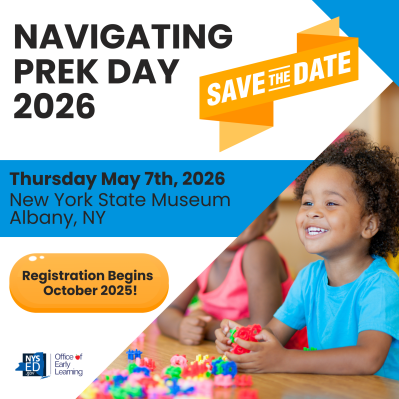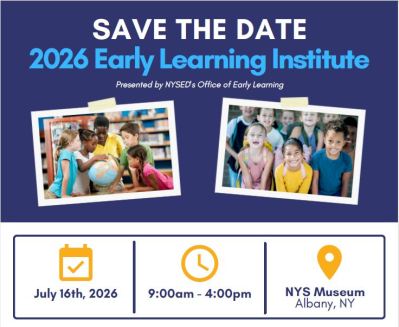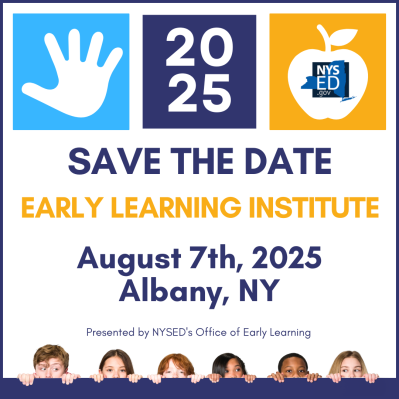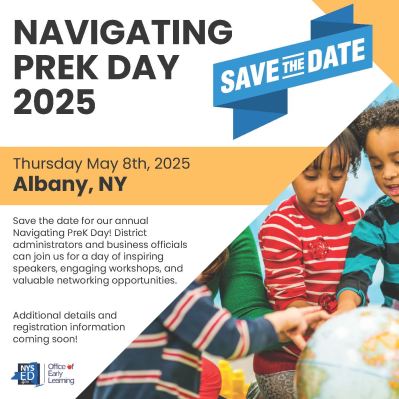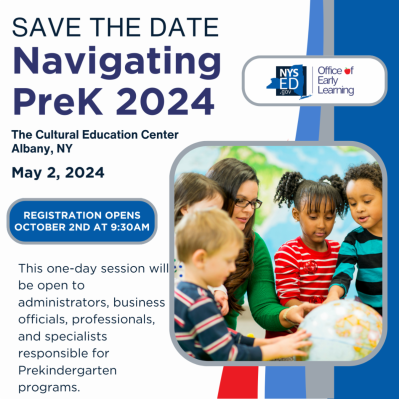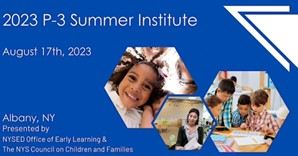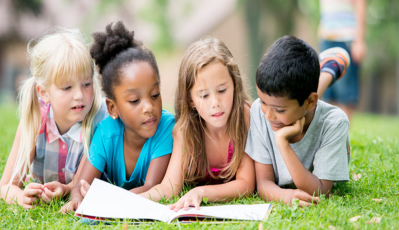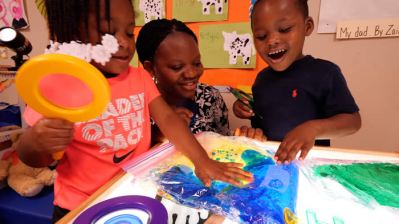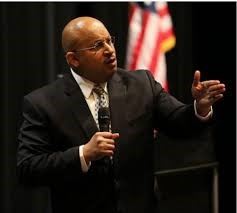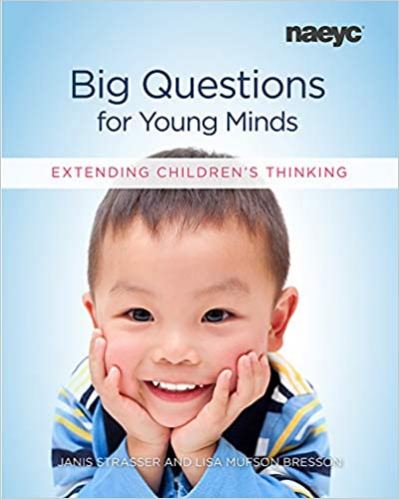Professional Development
Navigating PreK Day 2026
Mark your calendars for the 4th Annual Navigating PreK Day at the NYS Museum in Albany, NY! District administrators and business officials are invited to join the Office of Early Learning for a full day of dynamic speakers, interactive workshops, and meaningful networking opportunities. Check out our flyer for more information and register on Eventbrite here beginning October 2nd.
Early Learning Institute 2026
The Office of Early Learning invites teachers, specialists, and administrators responsible for PK-3 programming to the 2026 Early Learning Institute at the NYS Museum in Albany, NY! Please see the flyer for additional information and register on Eventbrite.
2025 Early Learning Institute
On Thursday, August 7th, 2025, the Office of Early Learning hosted the 2025 Early Learning Institute at the Cultural Education Center in Albany, NY. Teachers, specialists, and administrators responsible for PK-3 programming joined us for a day of collaborative learning. Please see our recent email with photos and highlights from the event. Slides from breakout sessions are available below.
2025 Early Learning Institute Agenda
Panels
Breakout Sessions
- Responsive Teaching: Centering Culture and Language in the Classroom
- Using the P-3 Toolkit to Support Project Based Learning
- P-3 Literacy Best Practices: Phonemic Awareness, Phonics, and Fluency
- Science Everywhere/P-3 Cultural Connections Toolkit
- The Power of Play: Unlocking Learning Through Joy & Exploration
- P-3 Literacy Best Practices: Comprehension, Oral Language, Vocabulary, and Writing
Navigating PreK Day 2025
On Thursday, May 8th, 2025, the Office of Early Learning hosted its third annual Navigating PreK Day in Albany, NY. The event was held at the Cultural Education Center from 9:00am to 4:00pm. Opening remarks were provided by the State Education Department, Senior Deputy Commissioner for Education Policy, Dr. Jeffrey Matteson and the Office of Early Learning Executive Director, Erik Sweet.
Representatives from Hannibal Central School District, Watervliet City School District, and Duanesburgh Central School District presented a panel discussion on the Prekindergarten Classroom Learning Environment. Representatives from Buffalo Public Schools and Medina Central School District presented a panel discussion on Prekindergarten Attendance.
The event also included breakout sessions and networking sessions for attendees, as well as, updates from the OEL fiscal team.
Navigating PreK Day 2025 Schedule
Panels
Breakout Sessions
- Fostering Success for Emergent Multilingual Learners
- Literacy in the PreK Classroom
- Science Everywhere
- Prekindergarten to Kindergarten Transition
Navigating PreK Day 2024
The NYS Office of Early Learning hosted its second annual Navigating PreK Day on Thursday, May 2, 2024, from 9:00 a.m. to 4:00 p.m. at the Cultural Education Center in Albany, NY.
Commissioner Betty A. Rosa provided opening remarks. Attendees learned about
- Building Relationships and Environments to Foster Positive Behavior,
- Implementing the Literacy Briefs in Prekindergarten, and
- Play-Based Learning.
Representatives from Buffalo City School District, Pulaski Central School District, Brushton-Moira Central School District, and Syracuse City School District shared examples of best practices from the field. Following the full group presentations, individuals had the opportunity to meet with an OEL liaison to ask district specific questions. The Schedule of this past event is available for reference.
Presentations
- Fostering Positive Behavior in the Prekindergarten Classroom
- Inclusion in PreK: Best Practices from the Field
- Implementing the Literacy Briefs in the PreK Classroom
- Play-Based Learning for Prekindergarten Students
- Highlights from the Field
Resources
Navigating PreK Day - September 20, 2023
The NYS Office of Early Learning hosted its first annual Navigating PreK Day on Wednesday, September 20, 2023 at The Cultural Education Center (Clark Auditorium).
District attendees learned about 2023-2024 UPK funding and the application process as well as systems and practices for multiple funding streams. Best practices for collaborating with Community-Based Organizations (CBOs) and the Request for Proposal (RPF) process was also discussed.
Following the full group presentations, individuals had the opportunity to meet with an OEL liaison to ask district specific questions. A schedule of this past event can be found here.
Presentations
- NYS Administered PreK Application & FS-10 Overview: How to Get Approved
- Systems & Practices for When You Have Multiple Funding Streams
- Collaborating with Community-Based Organizations
Navigating PreK Day 2023 Questions and Answers
P-3 Summer Institute 2023
The New York State Education Department is pleased to announce that the 2023 P-3 Summer Institute on August 17, 2023 was a success! The Institute which took place at the NYS Cultural Education Center in Albany was in partnership with the NYS Council on Children and Families. Please see event flyer here.
This one-day session was open to teachers, specialists, and administrators responsible for designing programs for students along the P-3 Continuum. Session topics were intended to support educators in creating a learning environment that reflect developmentally, culturally, and linguistically appropriate practices and instruction.
Event Resources
P-3 Summer Institute 2022
In July 2022, the NYS Council on Children and Families (CCF) is partnering with the NYS Education Department's Office of Early Learning to convene the annual P-3 Summer Institute.
Last year's P-3 Summer Institute is available online via pre-recorded presentations.
NYSED Office of Early Learning Video Series: A Guide for Educators Serving Children in Prekindergarten through 2nd Grade
The NYSED values play as an instructional strategy in the early childhood classroom. The video series includes examples of purposeful, play-based instructional strategies that assist children in developing critical foundational skills. In the early grades, it is particularly important for educators to recognize and provide a balance between individual and group needs, active and quiet times, teacher-directed and child-selected activities, and English and home language development. Teachers influence what and how children learn by creating an environment that reflects developmentally, culturally, and linguistically appropriate practices and instruction. Intentional planning provides a framework for learning that is culturally and linguistically responsive, playful, interactive and interdisciplinary.
Social Justice, Equity and Anti-Bias Early Childhood Education
These professional development videos feature dynamic presenters as they discuss topics on anti-bias education, social justice education, trauma and systemic racism, and culturally reflective practices. Principal Baruti Kafele’s presentation discusses the differences between equality and equity and defines social justice education. Dana Benzo defines anti-bias education and explains how educators can provide diverse learning experiences that advance equity and respect and respond to our students’ varying cultures. Tim Hathaway and Tamaé Memole's presentation describes the various types of trauma that have affect students, including systemic racism, and discusses ways to meet the needs of those experiencing such trauma.
From Executive Producer Alfre Woodard, No Small Matter is the first feature documentary to explore the most overlooked, underestimated, and powerful force for change in America today: early childhood education. Through poignant stories and surprising humor, the film lays out the overwhelming evidence for the importance of the first five years, and reveals how our failure to act on that evidence has resulted in an everyday crisis for American families, and a slow-motion catastrophe for the country.
NYSED Professional Learning Series
Recorded in November 2019, these dynamic presenters discuss academic rigor using developmentally appropriate practices, inspiring culturally sustainable environments and supporting thinking, language and learning in early childhood classrooms. Shannon Riley-Ayers, Ph.D., presents a video session recorded in November 2019 that uses data to paint the picture of the current state of instruction in kindergarten through third grade and identify opportunities for shifts in teaching to more effectively meet the needs of young learners. Miriam Beloglovsky unpacks the dispositions and conditions that children need to be successful in life and reviews how intellectual learning happens within the context of open-ended exploration with “loose parts” to support the development of children’s full potential. Janis Strasser, Ph.D., shares the many ways that early childhood teachers can use high level questions throughout the day (during read alouds, whole and small group meetings, music, outdoor explorations, creating and discussing classroom displays) and how "big questions" can help children think about and discuss diversity, families, and the school and home community.






